Best Fertilizer (Plant Food) for Begonias To Thrive And Bloom
Begonias appreciate a dose of balanced fertilizer. Only in case of a soil deficiency, go for a dedicated fertilizer rich in a specific nutrient.
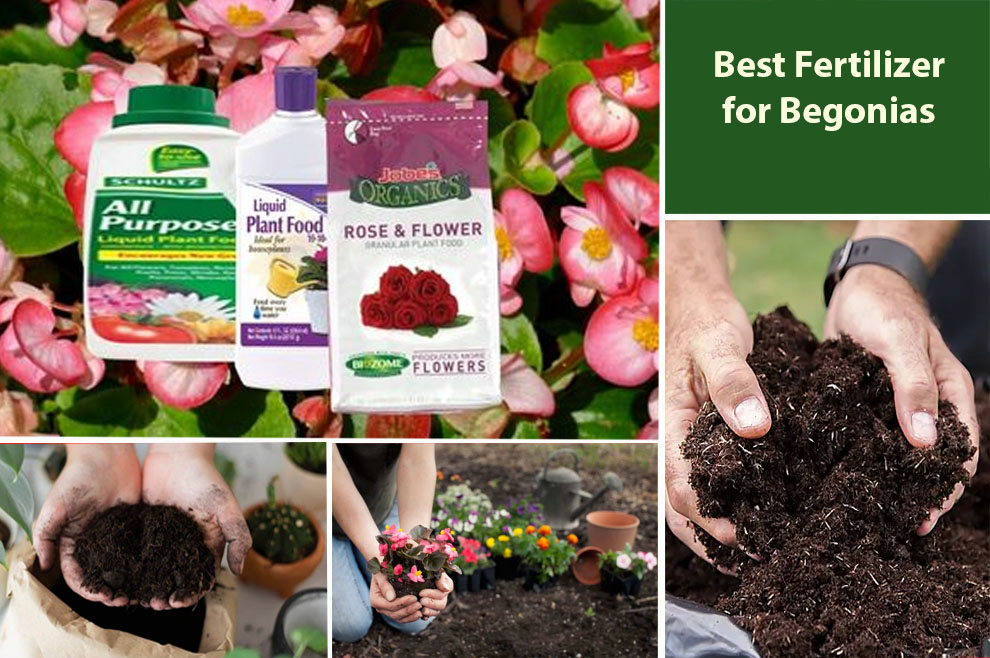
Begonias, known for their vibrant and striking flowers, are typically described as heavy feeders. They need a consistent supply of nutrients to thrive and flourish.
Feeding has a crucial role in the overall health of the plant, as it replenishes the vital elements that may be depleted from the soil over time. Laying your hands on the best fertilizer for begonia is imperative to cater to its vast nutritional demands and ensure vigorous development.
To offer begonias optimal nourishment, you must provide them with a well-balanced and nutrient-rich fertilizer. This plant food must contain a balanced mix of essential macronutrients like Nitrogen (N), Phosphorous (P), and Potassium (K).
In addition, they must also have micronutrients like calcium, magnesium, and iron. With these vital nutrients, the right plant food for begonias promotes healthy and vibrant foliage, supports root development, and encourages abundant flowering in begonias.
While you can find many alternatives in the market, Jacks Classic is an excellent choice for begonia enthusiasts. Its comprehensive formulation offers a balanced potpourri of nutrients that cater to begonias needs, meeting its blooming potential and ensuring optimal growth.
But this is not the only alternative available. Continue reading as we take you through the nutritional needs of begonias and how to meet them.
- Best Liquid Fertilizer for Begonias: – Bonide Liquid Plant Food
- Ideal Water-Soluble Pick: – Miracle-Gro Fertilizer
- Recommended for Blooms: – Jacks Classic No.1.5 From J R Peters
- Best Fertilizer for Potted Begonias: – Organic Earthpods Flower Fertilizer Sticks
- All Purpose Plant Feed: – Jobe’s All-Purpose Fertilizer Spikes
- Natural Plant Food: – Espoma Natural and Organic Flower-tone Fertilizer
Are Begonias Acid-Loving Plants?
Yes, all kinds of Begonias are acid-loving plants. They thrive in slightly acidic soil conditions and cherish a pH between 5.5 to 6.5.
Acidic soil is conducive for begonias to maintain optimal growth and absorb vital nutrients. An alkaline soil hinders nutrient availability and results in nutrient deficiencies.
Hence, you must employ the best food for begonias exquisitely formulated for acid-loving plants, or alter the soil with potting mix or organic matter to maintain the desired acidity level for begonias.
Failure to do so can further reduce the short lifespan of begonias.
Begonia Nutritional Needs
Begonias have specific nutritional needs, typically categorized into micro, macro, and secondary nutrients.
Begonias need the micronutrients in minute quantities. It comprises copper, manganese, iron, zinc, molybdenum, chlorine, and boron. These nutrients aid the plant in different physiological processes.
Further, they also require fertilizer to get an adequate amount of macronutrients. The plants need them in larger quantities. These include Potassium, Phosphorous, and Nitrogen, which promote root development, flowering, and overall growth.
Lastly, some secondary nutrients, such as sulfur, magnesium, and calcium, are also necessary for begonias. These aid in enzyme activation, photosynthesis, and cell structure.
Best Plant Food For Begonias
Below, we will address the six best options for fertilizing your begonias. Use them while planting begonias or thereafter as needed.
1. Best Liquid Fertilizer for Begonias
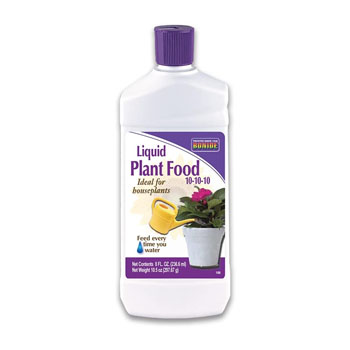 |
Check price on Amazon |
Type: Liquid fertilizer
NPK: 10-10-10
It is a specialized plant food meticulously crafted to meet the specific needs of common indoor houseplants, including begonias. This fertilizer fosters healthy growth, ultimately yielding vibrant and lush plants.
You can use this liquid fertilizer during watering sessions. By merely blending 1/8th tsp of the concentrated formula with one quart of water, you can provide your begonias with the crucial nutrients.
It has a balanced formulation, so each drop offers consistent nutrient content. With this Bonide fertilizer, your houseplants will thrive and flourish in optimal health.
2. Water-Soluble Miracle-Gro Fertilizer
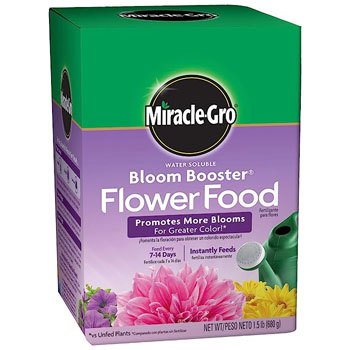 |
Check price on Amazon |
Type: Water-soluble
NPK: 15-30-15
It is a highly effective plant food that accentuates the blooming and colors in your flowering plants. Its exquisite formulation is enriched with high phosphorous content, ensuring impressive results in no time. The regular application of this fertilizer promotes abundant blooms.
You can use this for annuals and perennials in window boxes or containers. It is easy to use. You can feed via a watering can or the garden feeder. To ensure your plant receives optimal nourishment, consider fertilizing every seven to fourteen days during the growing season.
3. Jacks Classic No.1.5 From J R Peters
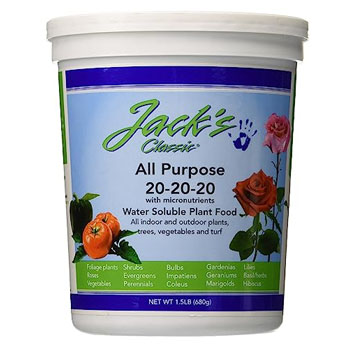 |
Check price on Amazon |
Type: Water Soluble
NPK: 20-20-20
It is a versatile, all-purpose best fertilizer for begonias plants that actually works for all types of flowering plants. You can use this fertilizer for indoor and outdoor plants. You get the fertilizer in a one-pound pack. It comes in a powdered form and offers ease of use and convenience.
The Jacks Classic fertilizer provides comprehensive nourishment to begonias and effectively feeds their leaves and roots, ensuring optimal nutrient absorption.
The balanced formulation contains a balanced NPK. It manifests vibrant green foliage and rapid leaf expansions. When employed indoors, it aids in maintaining the health and lushness of foliage plants, keeping them vibrant and green.
Trusted for generations, Jack’s Classic all-purpose feed is a reliable pick in the yards and gardens.
4. Best Fertilizer For Potted Begonias
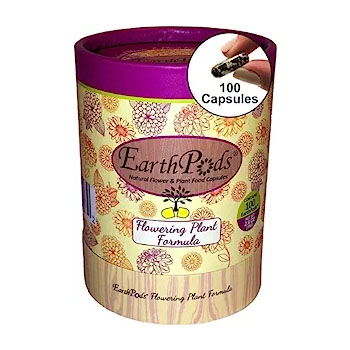 |
Check price on Amazon |
Type: Concentrated Capsules
EarthPods Organic Flower Bloom Booster is a premium organic plant food that accentuates root growth and flower production and boosts color vibrancy. You can use this feed for various flowering plants, including petunias, geraniums, begonias, and roses.
It comes in concentrated capsules. Hence, you can enjoy a mess-free and convenient application. Each tube has 100 EarthPods. One pack last for up to four years for a single flower container. It can last for four years in a single flower container.
Alternatively, use it for a vast collection of perennial and potted annual blooms. This is the best plant food for begonias with a proprietary formulation rich in organic plant nutrients, humates, and trace minerals, ensuring superior results.
With its easy-to-use design, you can push one EarthPod into the potting soil near the center of the flowering plant and water. The EarthPods break down slowly, releasing nutrients directly into the root zone. This eco-friendly fertilizer is compact and easy to store.
5. Jobe’s All-Purpose Fertilizer Spikes
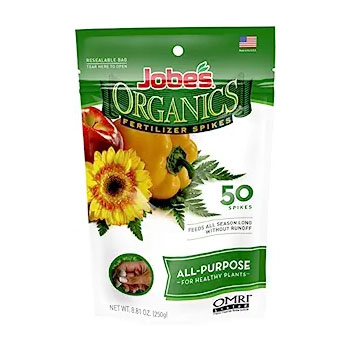 |
Check price on Amazon |
Type: Spikes
NPK: 4-4-4
Jobe’s Organic All-Purpose plant food is a time-release and organic fertilizer solution that nourishes the plants at their roots. These are pre-measured spikes and provide the plants with the correct dose of nutrients sans any risk of surface fertilizer run-off.
The spikes are formulated with a bone meal, feather meal, and potash sulfate, offering a balanced organic mix for optimal plant growth.
One of the standout features of Jobe’s Organics is the inclusion of Jobe’s Biozome, a proprietary blend of beneficial microorganisms, including Archaea. This unique formulation breaks down materials efficiently, promoting faster results and improving soil conditions.
Its spikes are mess-free and easy to use, preventing run-off and waste. You can insert the spikes around the plant’s dripline, and the slow-release formulation will feed the plants across the season. It is an OMRI-listed product suitable for organic gardening. You can use it indoors and outdoors.
6. Espoma Natural and Organic Flower-tone Fertilizer
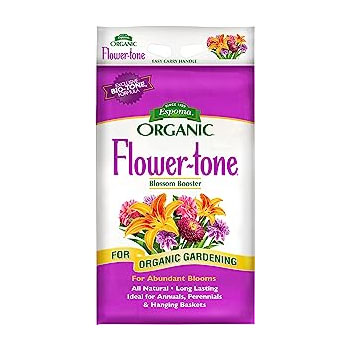 |
Check price on Amazon |
Type: Water Soluble
NPK: 3-4-5
Espoma Flower-tone is an organic plant food. It is formulated for different flowers, including roses, and other perennials, and annuals. It has a balanced blend of top-quality natural and organic materials rich with exquisite Bio-tone formula.
Flower-tone promotes abundant blooms courtesy of its low nitrogen fertilizer analysis of 3-4-5 and 5 percent calcium content. It has no toxic ingredients or sludges and is safe for the environment.
For optimal results, you must use it monthly across the growing season. Add the fertilizer to the soil around the plant’s drip line and ensure adequate watering.
Flower-tone is ready to use, requiring no mixing, and is made in the USA. Additionally, Flower-tone is approved for organic gardening and meets all the requirements for organic production.
Is Epsom Salt Good For Begonias or Any Other Item Like Coffee Grounds, Egg Shells, etc.?
Coffee grounds, Epsom salt, and eggshells are commonly talked about natural ways for begonia plant care. However, their suitability and effectiveness for begonias may vary. Let us discuss them one by one:
1. Epson Salt: It is rich in sulfur and magnesium. They are vital for plants. While magnesium deficiency can affect plant growth, begonias do not usually have a high magnesium requirement.
So using Epsom salt as a plant food might not offer significant benefits unless you note a specific deficiency in the soil.
2. Coffee grounds: They have high nitrogen content. Nitrogen is essential for plant growth. Also, coffee grounds can be acidic, and begonias thrive in slightly acidic to neutral soil pH.
Hence, you must use coffee grounds sparingly or compost them before adding them to the soil to avoid disrupting the pH balance.
3. Eggshells: Crushed eggshells are a calcium source. They play a crucial role in cell development and support plant health. Incorporating crushed eggshells into the soil offer a slow-release calcium source.
But begonias are not particularly calcium-demanding plants. Hence, using eggshells as a soil amendment has a minimal impact unless you note a calcium deficiency.
When To Fertilize Begonia?
For healthy growth and development, fertilize the begonias at the appropriate times. You must get your hands on the best fertilizers for begonias while planting them. It gives them a good start.
This initial feeding supports early growth and helps establish robust roots. Further, begonias benefit from regular fertilization during the active growing period, typically from spring to summer.
So, you must feed them every 14 to 28 days. It helps cater to the plant’s nutrient requirements. But please consider the specific fertilizer instructions and alter the dosage and frequency accordingly.
However, you must not feed or lower the feeding during the winter. It is when the plants are dormant. Hence, they need lesser nutrition.
How To Fertilize Begonias?
Feeding begonias demands a careful approach to ensure they receive the nutrients they seek sans inflicting any harm on them.
Experts usually recommend water-soluble options for the begonias. Dilute the fertilizers as per the package instructions. Further, using a sprayer or watering can feed your plants. Apply the plant foods evenly around the plant’s base, ensuring it does not come in direct contact with the leaves to avoid burning.
If you are using fertilizer capsules or spikes, simply insert it in the pot or ground and forget about it. It will slowly work its magic through.
In case of granular fertilizer, sprinkle it around the base of the plant but not too close to the main stem. Check the package instruction, whether to water them afterward or not.
How To Choose The Best Feed For Begonias?
When picking a fertilizer for begonias, please take into account the below-listed factors:
1. Soil conditions: Assess the soil’s pH level and overall quality. Begonias cherish slightly acidic to neutral soil conditions. If the soil is too acidic or alkaline, make amendments before applying fertilizer.
2. Nutrient insufficiencies: Look for specific nutrient deficits in the begonias. Common deficiencies include magnesium, iron, potassium, phosphorous, and nitrogen. Inspect for signs like poor flowering, stunted growth, or yellowing leaves, and then pick a plant food that addresses the specific deficiencies to rectify these issues.
3. Balanced NPK vs. specific nutrient-based products: Decide whether you wish to employ a balanced plant food with similar or equal NPK ratios or prefer a targeted NPK product.
Balanced plant food offers overall nourishment, while specific nutrient-based products cater to particular needs, such as bloom boosters with high phosphorous content to support flowering.
4. Synthetic vs. organic fertilizers: Consider whether you desire synthetic or organic feeds. Organic plant foods are sourced from natural sources. They better soil quality and improve soil health over time. On the contrary, synthetic fertilizers deliver nutrients fast but pose a risk of nutrient run-off.
5. Application method: Lastly, assess the most suitable application method for your needs. You can use liquid fertilizers, granular slow-release fertilizers, or fertilizer spikes. Choose a technique that aligns with your gardening preferences and the specific requirements of your begonias.
Employing these factors, you can select the best feed for your begonias to ensure they receive the nutrients for healthy growth, vibrant foliage, and abundant blooms.
